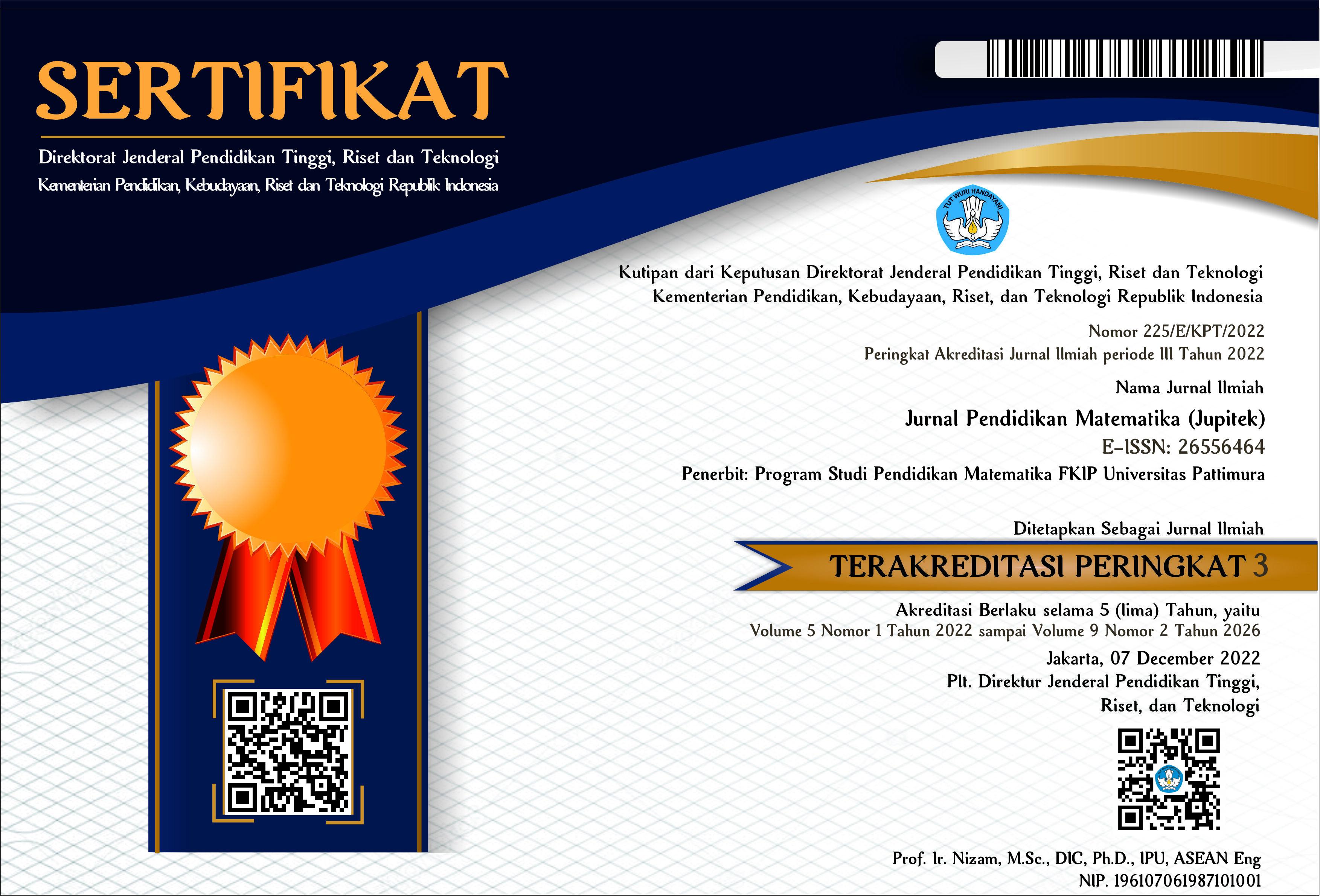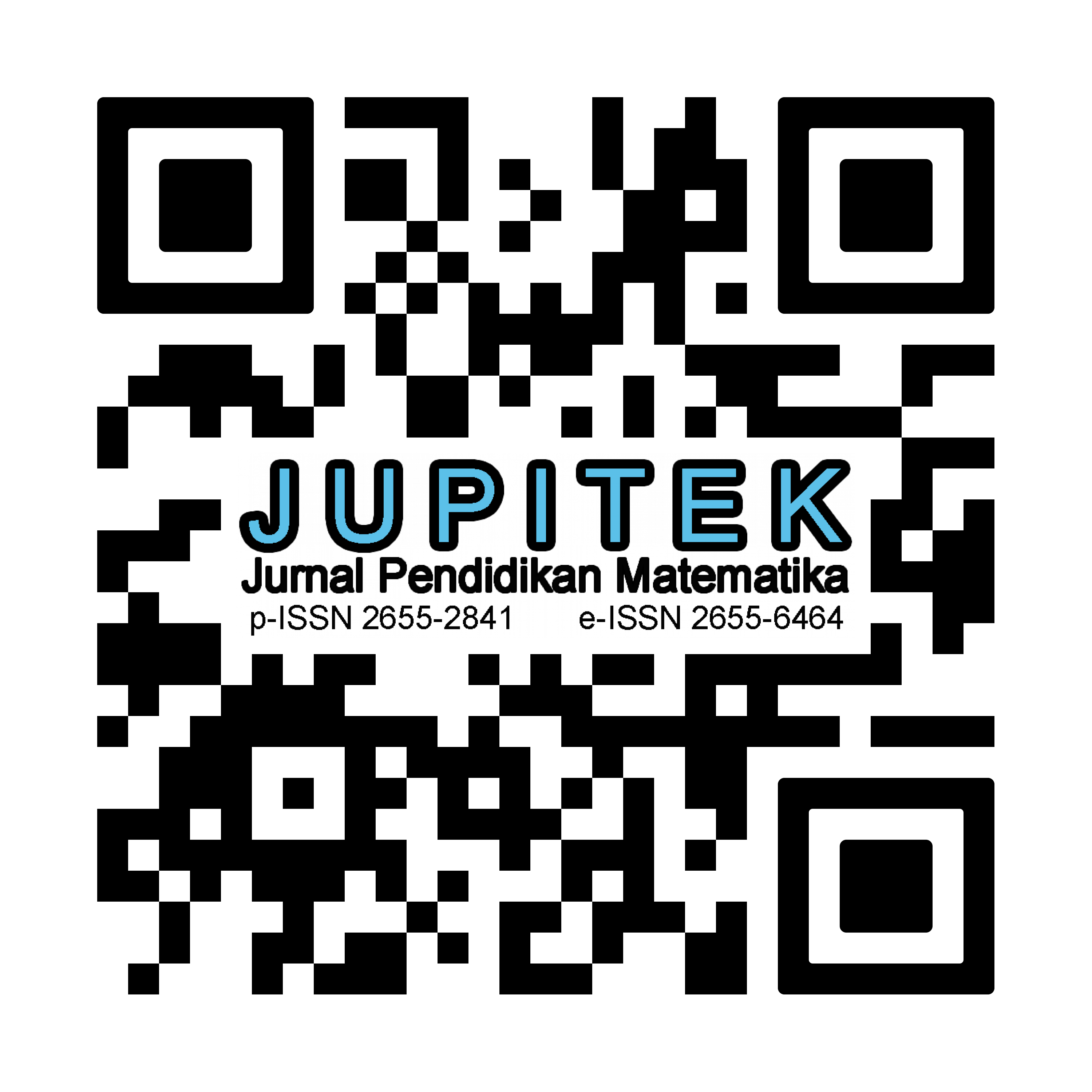PENGARUH PENGGUNAAN MEDIA KOMIK DAN MOTIVASI BELAJAR TERHADAP HASIL BELAJAR MATEMATIKA SISWA SMP
Abstract
This research is a quasi-experimental research with an experimental design aimed at: 1) know the influence of the presentation of material in the form of comic media and without comic media on student mathematics learning outcomes; 2) know the interaction of the presentation of the material with learning motivation towards student mathematics learning outcomes; 3) find out whether the results of learning mathematics students who have high learning motivation and are taught by presenting material in the form of comic media is higher than without using comic media; 4)find out whether the results of learning mathematics students who have low learning motivation and are taught by presenting material in the form of comic media is higher than without using comic media. This research involved all SMP in Kab. Gowa. Determination of the sample is done by selecting an A accredited school, while determining the class as a sampling unit using the Purposive Sampling technique with the selected class having more dominant reading interest. So that class VIIIA was chosen at SMP Neg. 1 Sungguminasa as an experimental class and Class VIIIB in SMP Neg. 4 Sungguminasa as a control class. Variables consist of free variables and bound variables. Free variables presented in the form of a comic media and learning motivation while bound variables using the student maths result. The learning tools developed consists of students book (comic media), students worksheet book (comic media) and lesson plan. The data collected in this study were students 'learning motivation obtained using the learning motivation questionnaire instrument and students' mathematics learning outcomes were obtained using the mathematics learning achievement test instrument. Analysis of student mathematics learning outcomes test results using descriptive analysis and inferential analysis namely ANAVA and independent sample t-test. The results that:1) there is an influence between the presentation of material in the form of comic media and the presentation of material without using comic media on student mathematics learning outcomes; 2) there is no interaction of the presentation of the material with learning motivation on student mathematics learning outcomes; 3) mathematics learning outcomes of students who have high learning motivation and are taught by presenting material in the form of comic media are higher than without using comic media; 4) mathematics learning outcomes of students who have low learning motivation and are taught by presenting material in the form of comic media are higher than without using comic media
Downloads
References
Agunistari, Bevira. (2012). Media Pembelajaran Berbasis E-Komik pada Mata Pelajaran Teknologi Informasi dan Komunikasi. Tesis. Program Pascasarjana Universitas Pendidikan Indonesia.
Arsyad, Azhar. (2011). Media Pembelajaran. Jakarta: Rajawali Pers.
Asdar, Ahsanul Khair. (2013). Pengembangan Perangkat Asessmen Alternatif pada Pembelajaran Dimensi Tiga Setting Kooperatif pada Siswa Kelas XI SMK. Tesis. Program Pascasarjana Univ. Negeri Makassar.
Darmawan, Deni. (2013). Metode Penelitian Kuantitatif. Bandung: PT. Remaja Rosda Karya.
Fatra, Maifalinda. (2008). Penggunaan KOMAT (Komik Matematika) Pada Pembelajaran Matematika di MI. Jurnal Pendidikan Matematika FITK UIN Jakarta, 3(1), 1-15.
JPPI New Indonesia. (2018). Bank Dunia: Kualitas Pendidikan Indonesia Masih Rendah. https://new-indonesia.org/bank-dunia-kualitas-pendidikan-indonesia-masih-rendah/# (Online). Diakses 25 Oktober 2019.
Kanreguru. (2009). Model Pengajaran Langsung (Direct Istruction), (http:/kanreguru.wordpress.com/2009/09/12/57/, Diakses tanggal 27 Februari 2011).
Mahfuddin. (2012). Menumbuhkan Minat Belajar Siswa dalam Pembelajaran Seni Rupa (Online), (http://mahfudin.guru-indonesia.net/artikel_detail-23663.html, Diakses 18 Januari 2013).
Novianti, R. D. & Syaichudin, M. (2010). Pengembangan Media Komik Pembelajaran Matematika untuk Meningkatkan Pemahaman Bentuk Soal Cerita Bab Pecahan pada Siswa Kelas V SDN Ngembung. Jurnal Teknologi Pendidikan UNS, (Online), Vol. 10, No. 1 (www.tp.ac.id, Diakses 17 Januari 2013).
Nurkancana, W & Sumartana. (1983). Evaluasi Pendidikan. Surabaya: Usaha Nasional
Sudjana, Nana & Rivai, Ahmad. (2001). Media Pengajaran. Bandung: Sinar Baru Algesindo.
Usman, Uzer. (2008). Menjadi Guru Profesional. Bandung: Remaja Rosdakarya
Copyright (c) 2020 Widya putri ramadhani

This work is licensed under a Creative Commons Attribution-NonCommercial-ShareAlike 4.0 International License.
License and Copyright Agreement
By submitting a manuscript to Jurnal Pendidikan Matematika (JUPITEK), the author(s) certify and agree to the following terms:
- Originality and Authority: The submitting author is authorized by all co-authors to enter into this agreement. The manuscript describes original work that has not been published previously in a peer-reviewed journal, nor is it under consideration for publication elsewhere.
- Approval: Its publication has been approved by all author(s) and by the responsible authorities of the institutions where the work was carried out.
- Rights: The authors secure the right to reproduce any material that has already been published or copyrighted elsewhere.
- Licensing and Copyright: Authors retain the copyright to their work.
- License Grant: The authors grant Jurnal Pendidikan Matematika (JUPITEK) the right of first publication, with the work simultaneously licensed under the Creative Commons Attribution-NonCommercial-ShareAlike 4.0 International (CC BY-NC-SA 4.0).
- Self-Archiving: Authors are permitted and encouraged to deposit the published version of their article in institutional repositories, on their personal websites, and other academic platforms, with proper acknowledgment of its initial publication in Jurnal Pendidikan Matematika (JUPITEK).






.png)


